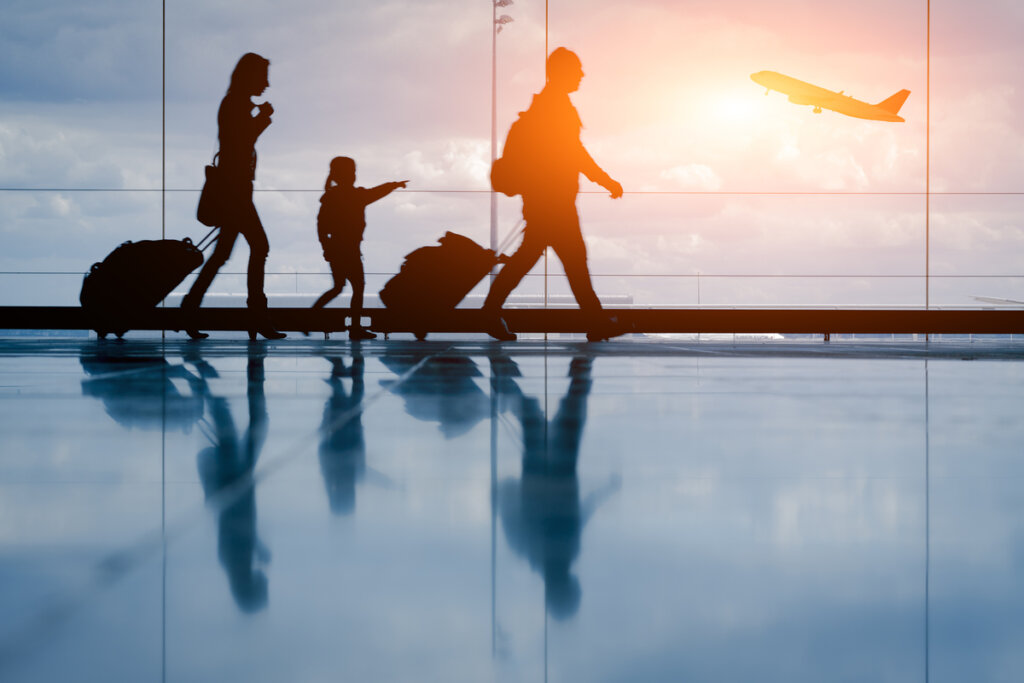Emigrating with Children: How to Encourage Them to Adapt


Written and verified by the psychologist Sharon Laura Capeluto
Moving to another country is always a challenge that involves many worries, but emigrating with children demands extra care on our part, as adults. That’s because, regardless of the reason a family decides to leave their country of origin, the process of adapting to a new culture isn’t an easy one.
This leap into the unknown is accompanied by feelings of uncertainty that are often difficult to manage. On an emotional level, it’s natural to experience a whirlwind of sensations when adapting to a change of such magnitude. That said, while the multiple losses associated with the move can be upsetting, there’s often also a sense of progress and growth.
Anyone who moves from one country to another must go through a process to get to know and incorporate new and unprecedented elements into their life. For instance, a new home, neighborhood, customs, food, climate, and sometimes even a new language. For children, added to this is the adaptation to a new school and peer group. How can we help them in this process?
How to make emigrating with children easier
As adults, we’re taken over by stress and anxiety when we experience any significant changes in our lives. It’s the same for children. Nevertheless, we shouldn’t necessarily always approach emigrating with children in the same way. In fact, the best way to do it will vary, depending on their individual personalities.
While some individuals are highly adaptable and can tolerate uncertainty well, there are others who are particularly sensitive. As a rule, there are certain fundamental elements that can help our children experience this process in the most harmonious way possible. Read on to find out.

1. Children need information
As adults, we often choose to hide certain information from our children for the simple fact that we don’t know how to communicate it. However, moving to another country without talking about it in detail is certainly not a good move. In fact, sudden and unexpected changes often shake children’s mental stability, negatively affecting their well-being.
For this reason, if possible, it’s recommended that children participate in most stages of the emigration process. In addition, the reasons for the move should be shared with them in a language they can understand.
They should be shown how to access information about the place that’ll be their new home. They should also look at photos, have the new location marked on a map, and their questions should be answered honestly.
If they ask questions to which we don’t know the answers we should tell them “I don’t know, let me find out and I’ll tell you”, or “I don’t know, we’ll find out once we get there”. In short, we must make their immediate future, which has suddenly become full of uncertainty, more predictable for them.
2. Give free rein to their emotions
If we want to successfully emigrate with our children, we need to know what migratory grief is and the emotions that usually go along with it. We must make sure that we validate their emotions, and acknowledge and make them see that the emotional state they’re going through is perfectly logical.
They’ll need to say goodbye to their friends, teachers, and relatives who remain behind, as well as any valuable objects or environments. We must treat them with empathy and respect.
Emigrating with children means taking into account that each member of the family will experience the process in a unique way. Not everyone lives this experience in the same way. Therefore, it’s important that children feel heard and are active participants in the process. After all, it involves their lives too.
3. Allow them to continue playing
Although it’s only natural that the family routine will be disorganized once the decision to emigrate is made, the habits and daily practices that serve as reference points for children should be maintained. However, once plans are put into action, it’s likely that there won’t be much time. There’ll be many decisions to make and tasks to be undertaken. For example, obtaining visas, choosing a neighborhood to live in, finding housing and schools, deciding what to bring and what not, when to travel and how, etc.
Nevertheless, amidst the chaos, our children need to maintain certain parts of their routine in order to feel safe. Playing is one of their main activities which helps their emotional regulation. For this reason, now isn’t the time to stop them from playing.
Furthermore, we should try to continue devoting time and energy to the playful moments that we shared with them before. It’s really important for them. Bear in mind that routines will reduce their levels of stress and anxiety.
4. Help them adapt to their new school
In itself, a change of school is a work of adaptation. Moreover, if the new school is really different from the previous one, things can get a little more complicated. There are many variables that come into play in this process. Is the child able to master the language of their new environment? Is the school community diverse and inclusive? In what period of the school year will they start?
Younger children generally have a greater ability to adapt to new environments and experience less difficulty learning new languages. On the other hand, older children tend to be more resistant to change, since they’re more rooted in social groups outside the family environment. In some cases, they may need psychological and pedagogical support.
Whether the children are under or over 12 years old, it’s a good idea to make a previous visit to the new school before they start. This means they’ll be able to familiarize themselves with it and get to know some of the teachers or directors.
All children can be affected by changing schools and, as adults, we can take certain measures to minimize the effects.

5. The importance of being honest
As adults, we transmit our emotions to our children, even if we don’t communicate them explicitly. Therefore, it’s essential that we adopt an honest attitude toward both them and ourselves. After all, every emotion is valid and it’s not necessary to hide any of them.
If you’re currently facing the situation of emigrating with your children and feel afraid, don’t hide it from the rest of your family. Unpleasant emotions are all part of the process, as well as pleasant ones. Indeed, there can be no doubt that emigrating with children isn’t easy. You can only try and do your best, remembering that it’s simply not possible to do things perfectly.
Moving to another country is always a challenge that involves many worries, but emigrating with children demands extra care on our part, as adults. That’s because, regardless of the reason a family decides to leave their country of origin, the process of adapting to a new culture isn’t an easy one.
This leap into the unknown is accompanied by feelings of uncertainty that are often difficult to manage. On an emotional level, it’s natural to experience a whirlwind of sensations when adapting to a change of such magnitude. That said, while the multiple losses associated with the move can be upsetting, there’s often also a sense of progress and growth.
Anyone who moves from one country to another must go through a process to get to know and incorporate new and unprecedented elements into their life. For instance, a new home, neighborhood, customs, food, climate, and sometimes even a new language. For children, added to this is the adaptation to a new school and peer group. How can we help them in this process?
How to make emigrating with children easier
As adults, we’re taken over by stress and anxiety when we experience any significant changes in our lives. It’s the same for children. Nevertheless, we shouldn’t necessarily always approach emigrating with children in the same way. In fact, the best way to do it will vary, depending on their individual personalities.
While some individuals are highly adaptable and can tolerate uncertainty well, there are others who are particularly sensitive. As a rule, there are certain fundamental elements that can help our children experience this process in the most harmonious way possible. Read on to find out.

1. Children need information
As adults, we often choose to hide certain information from our children for the simple fact that we don’t know how to communicate it. However, moving to another country without talking about it in detail is certainly not a good move. In fact, sudden and unexpected changes often shake children’s mental stability, negatively affecting their well-being.
For this reason, if possible, it’s recommended that children participate in most stages of the emigration process. In addition, the reasons for the move should be shared with them in a language they can understand.
They should be shown how to access information about the place that’ll be their new home. They should also look at photos, have the new location marked on a map, and their questions should be answered honestly.
If they ask questions to which we don’t know the answers we should tell them “I don’t know, let me find out and I’ll tell you”, or “I don’t know, we’ll find out once we get there”. In short, we must make their immediate future, which has suddenly become full of uncertainty, more predictable for them.
2. Give free rein to their emotions
If we want to successfully emigrate with our children, we need to know what migratory grief is and the emotions that usually go along with it. We must make sure that we validate their emotions, and acknowledge and make them see that the emotional state they’re going through is perfectly logical.
They’ll need to say goodbye to their friends, teachers, and relatives who remain behind, as well as any valuable objects or environments. We must treat them with empathy and respect.
Emigrating with children means taking into account that each member of the family will experience the process in a unique way. Not everyone lives this experience in the same way. Therefore, it’s important that children feel heard and are active participants in the process. After all, it involves their lives too.
3. Allow them to continue playing
Although it’s only natural that the family routine will be disorganized once the decision to emigrate is made, the habits and daily practices that serve as reference points for children should be maintained. However, once plans are put into action, it’s likely that there won’t be much time. There’ll be many decisions to make and tasks to be undertaken. For example, obtaining visas, choosing a neighborhood to live in, finding housing and schools, deciding what to bring and what not, when to travel and how, etc.
Nevertheless, amidst the chaos, our children need to maintain certain parts of their routine in order to feel safe. Playing is one of their main activities which helps their emotional regulation. For this reason, now isn’t the time to stop them from playing.
Furthermore, we should try to continue devoting time and energy to the playful moments that we shared with them before. It’s really important for them. Bear in mind that routines will reduce their levels of stress and anxiety.
4. Help them adapt to their new school
In itself, a change of school is a work of adaptation. Moreover, if the new school is really different from the previous one, things can get a little more complicated. There are many variables that come into play in this process. Is the child able to master the language of their new environment? Is the school community diverse and inclusive? In what period of the school year will they start?
Younger children generally have a greater ability to adapt to new environments and experience less difficulty learning new languages. On the other hand, older children tend to be more resistant to change, since they’re more rooted in social groups outside the family environment. In some cases, they may need psychological and pedagogical support.
Whether the children are under or over 12 years old, it’s a good idea to make a previous visit to the new school before they start. This means they’ll be able to familiarize themselves with it and get to know some of the teachers or directors.
All children can be affected by changing schools and, as adults, we can take certain measures to minimize the effects.

5. The importance of being honest
As adults, we transmit our emotions to our children, even if we don’t communicate them explicitly. Therefore, it’s essential that we adopt an honest attitude toward both them and ourselves. After all, every emotion is valid and it’s not necessary to hide any of them.
If you’re currently facing the situation of emigrating with your children and feel afraid, don’t hide it from the rest of your family. Unpleasant emotions are all part of the process, as well as pleasant ones. Indeed, there can be no doubt that emigrating with children isn’t easy. You can only try and do your best, remembering that it’s simply not possible to do things perfectly.
All cited sources were thoroughly reviewed by our team to ensure their quality, reliability, currency, and validity. The bibliography of this article was considered reliable and of academic or scientific accuracy.
- Achotegui, J. (2000) Los duelos de la migración. Jano. Psiquiatría y humanidades.nº2.
- Gomez Florez, A. (2018) ¿Como se adaptan los niños a los cambios? Banco Interamericano de Desarrollo. Recuperado en: https://blogs.iadb.org/desarrollo-infantil/es/como-se-adaptan-los-ninos-al-cambio/
This text is provided for informational purposes only and does not replace consultation with a professional. If in doubt, consult your specialist.







